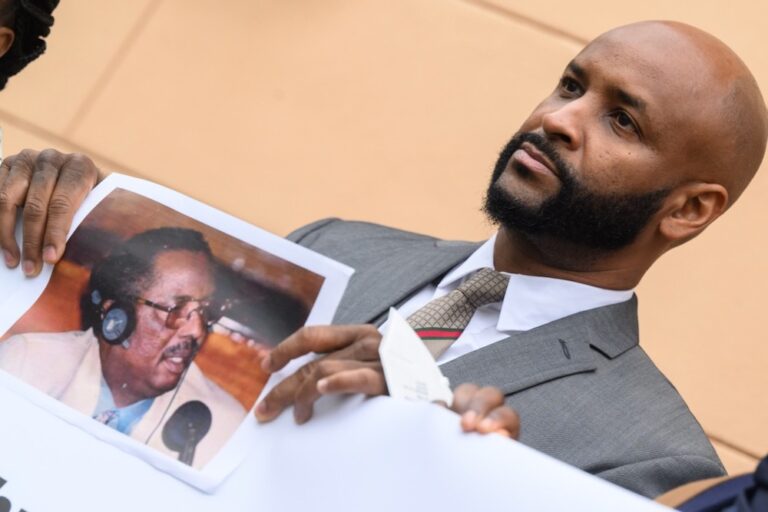There is no freedom in The Gambia, where journalists in particular are routinely subjected to unfair trials, arrests and targeting by security agencies, says IFJ.
(IFJ/IFEX) – 23 July 2010 – The International Federation of Journalists (IFJ) joined forces yesterday on Gambia Freedom Day with the British Trades Union Congress (TUC) and Amnesty International to press the Foreign and Commonwealth Office (FCO) in the UK to address the appalling human rights record of President Yahya Jammeh’s government and its continued attacks on journalists and freedom of expression in the Gambia. They urged urgent action in particular to release journalist Ebrima Manneh who was arrested in July 2006, and disappeared ever since.
IFJ President Jim Boumelha and Gambia Press Union Vice-President Sarata Jabbi Dibbi joined Owen Tudor, Head of the TUC European and International Department, and Amnesty representatives in a meeting with officials in charge of human rights and the Gambia desk at the FCO.
“Freedom Day is a sham and a cynical exercise in deceit by President Jammeh’s government. There is no freedom in the Gambia where its citizens, journalists in particular, are routinely subject to unfair trials, arrests, and targeting by security agencies,” said IFJ President Boumelha.
The 22nd July is designated by the Gambian government as “Freedom Day” but this has more to do with commemorating President Jammeh seizing power by force 16 years ago than celebrating freedoms.
IFJ affiliate in the Gambia, the Gambia Press Union (GPU), has been at the forefront of the campaigns to hold the government to account for its actions, calling for the restoration of civil and democratic rights, in particular freedom of expression. In recent years they have been facing a violent campaign by security agencies and a partisan judiciary, including closure of newspapers and arbitrary harassment, arrest and trial of their members.
The GPU has been campaigning for justice in the case of two of its members – Deydra Hydara, former editor of The Point newspaper, allegedly killed in 2004 by security operatives -, and Daily Observer journalist Chief Ebrima Manneh – a victim of enforced disappearance for four years despite an ECOWASS Community Court’s ruling that he be released and damages be paid to his family.
The most spectacular case took place last year when the Gambia government seized seven journalists in June 2009, including three officials of the GPU and charged them with sedition. The following global campaign involving the IFJ and its affiliates forced President Jammeh to release them a few months later.
Jabbi Dibbi told the FCO officials about what the trial, conviction and release meant to her. She had a baby shortly before the trial, and was still nursing her baby when she was jailed in early August 2009, and sentenced to two years.
“The FCO has put all these issues on the agenda of their formal meetings with the Gambian government, including the demand for an independent enquiry into the disappearance of Ebrima Manneh and they have assured us they will continue to press for an improvement in human rights,” said Boumelha. “But more must be done urgently at the level of the European Union and the Commonwealth. Only political and economic pressure can force President Jammeh to respect the civil and democratic rights of citizens.”


